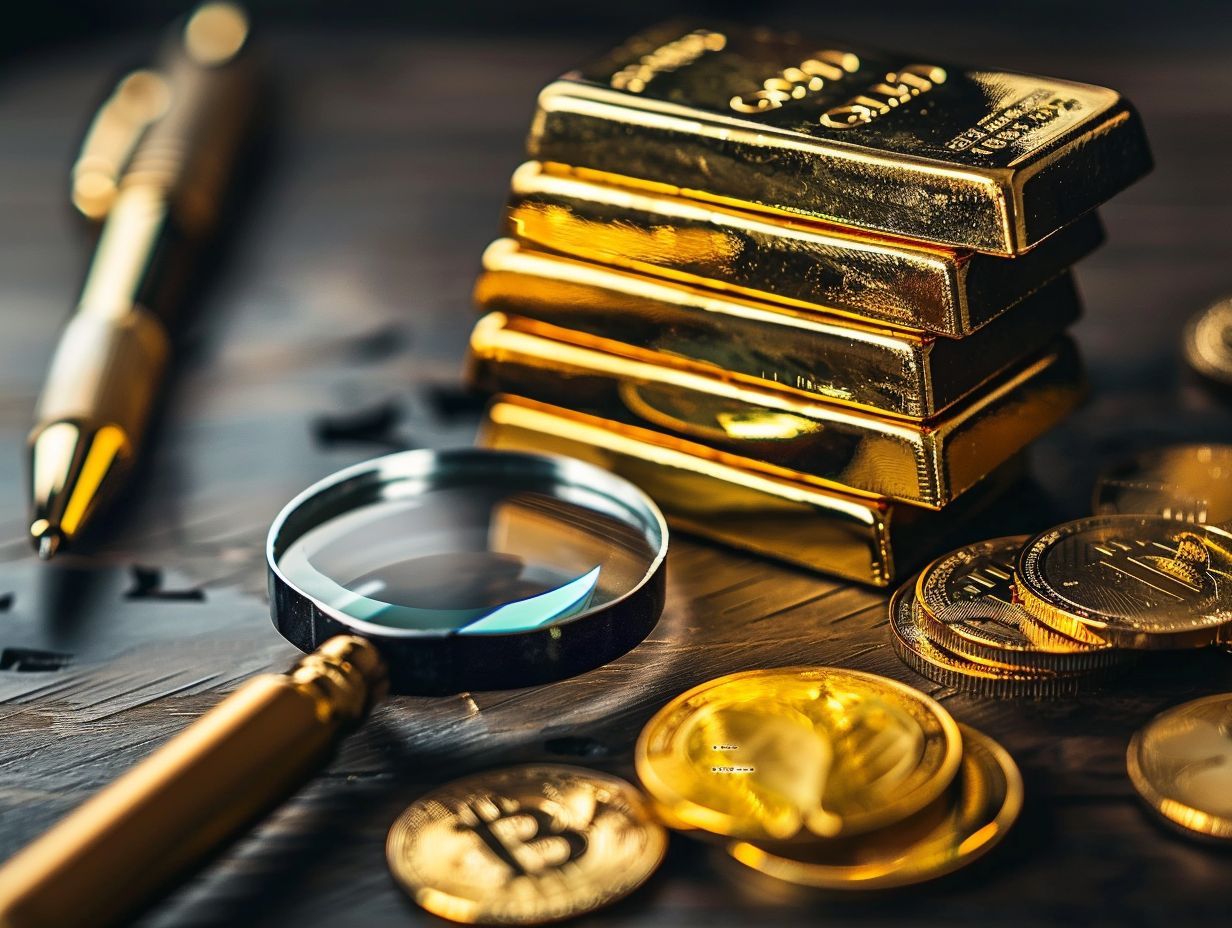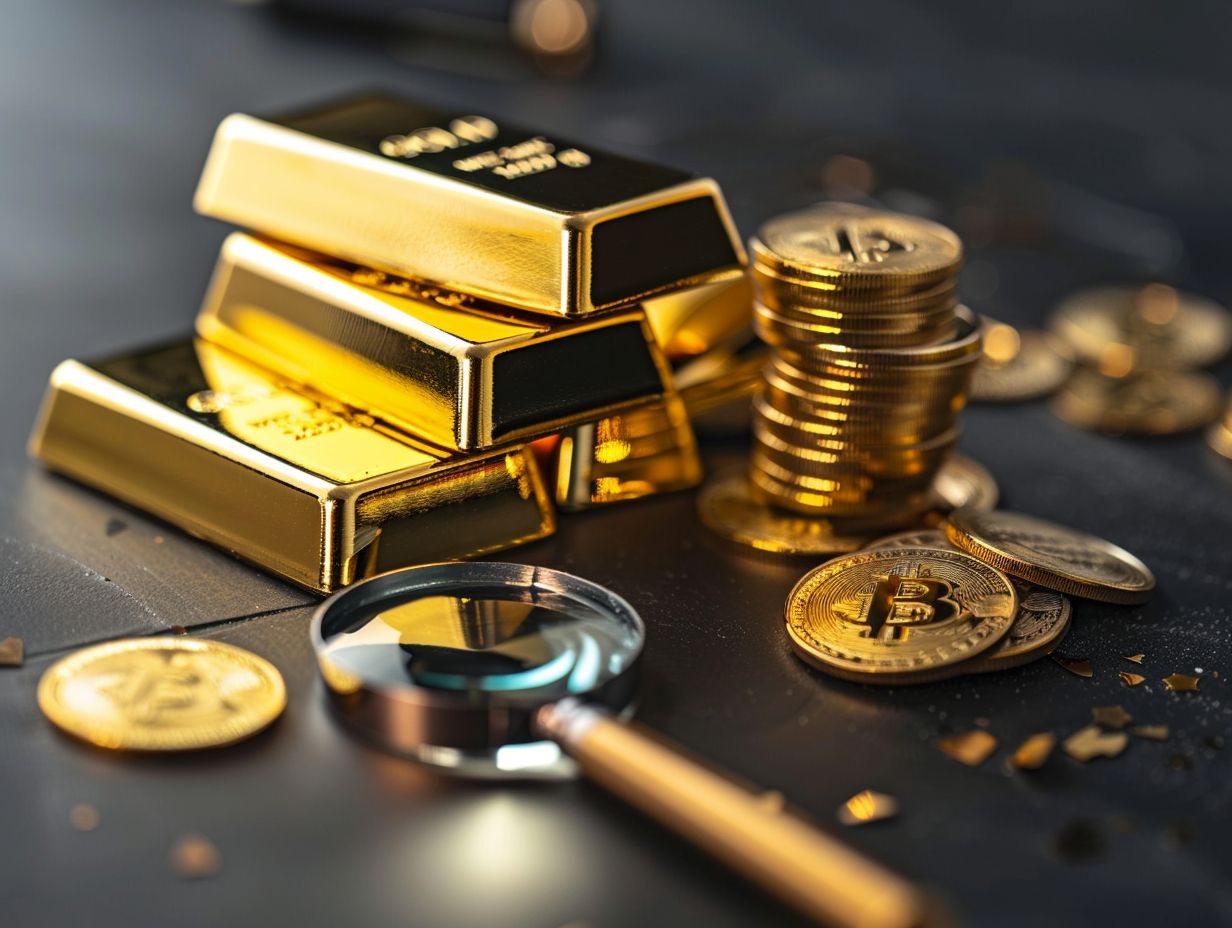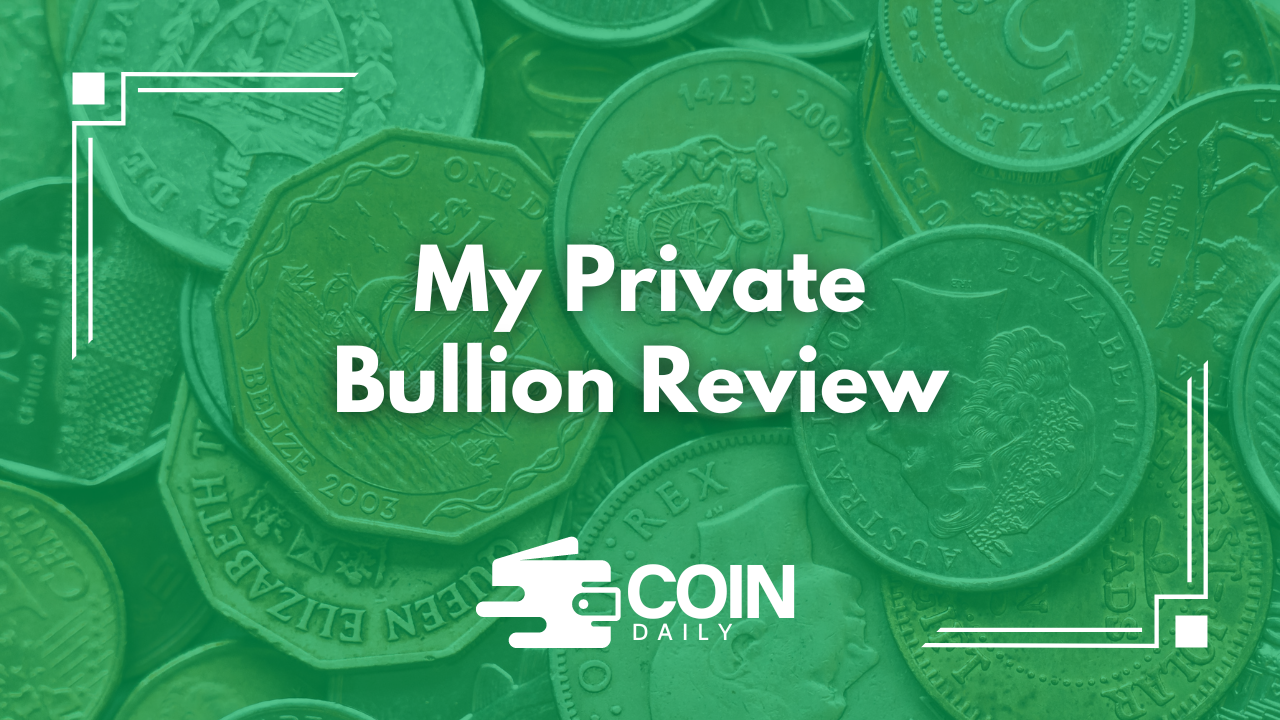If one is considering diversifying an investment portfolio with precious metals, understanding the offerings of My Private Bullion can significantly impact investment strategies.
This article will examine the range of products available, including gold, silver, platinum, and palladium coins, while also highlighting the advantages associated with investing in these assets.
It is crucial to evaluate these benefits in conjunction with potential risks.
Furthermore, the article will provide a comprehensive overview of the account setup process, associated fees, and authentic customer feedback to assist in making an informed decision.
What Is My Private Bullion?

My Private Bullion is a reputable bullion dealer specializing in a diverse range of precious metal options, including gold and silver bullion. The platform is dedicated to facilitating secure buying and selling processes, ensuring that customers have access to valuable investment opportunities within the precious metal market.
With tailored investment strategies for both novice and seasoned investors, My Private Bullion positions itself as a reliable resource for wealth preservation and asset diversification. Given the fluctuations in gold and silver prices due to market demand, My Private Bullion provides comprehensive market analysis and investment advice, enableing clients to make informed decisions regarding their investment portfolios.
What Are The Products Offered By My Private Bullion?
My Private Bullion provides a comprehensive array of products tailored to accommodate various investment strategies, featuring a selection of gold coins, silver coins, platinum coins, and palladium coins. Each product is meticulously crafted to meet the requirements of both collectors and investors, guaranteeing high product quality and adherence to industry standards.
Whether one seeks to acquire physical gold, silver bullion, or other precious metals, My Private Bullion offers an extensive catalog designed to support diverse financial objectives, including wealth management and portfolio diversification.
1. Gold Coins
Gold coins represent a prominent investment strategy for individuals seeking to enhance their portfolios with tangible assets that have a proven historical record of retaining value over time. These coins not only serve as an investment opportunity but also possess intrinsic value linked to gold prices and prevailing market trends. Investors have the option to select from various types of gold coins, including bullion coins and collectible coins, each providing distinct advantages.
Bullion coins, such as the American Gold Eagle and the Canadian Maple Leaf, are particularly appealing to those focused on gold’s purity and weight, as they offer a straightforward means of trading and achieving liquidity. Conversely, collectible coins, which may include numismatic varieties, often command premiums due to their rarity and historical significance, attracting both enthusiasts and experienced investors.
As market demand fluctuates, the value of both categories of coins can appreciate significantly, rendering them versatile assets within a comprehensive investment strategy aimed at wealth preservation and diversification. Incorporating gold coins into an investment portfolio can provide a hedge against inflation, thereby adding an additional layer of security.
2. Silver Coins
Silver coins, as a category of silver bullion, represent a substantial investment opportunity for individuals aiming to diversify their portfolios with precious metals. The allure of silver coins stems from their liquidity and potential for significant returns, particularly given the increasing demand for silver across various industries. Investors should remain aware of the price volatility within the silver market and consider their long-term investment objectives.
Among the diverse types of silver coins available, options such as American Silver Eagles, Canadian Silver Maple Leafs, and various commemorative coins are particularly noteworthy. Each of these coins possesses unique attributes, including purity and design, which may appeal differently to collectors and investors.
When assessing the investment potential of silver coins, it is essential to weigh the advantages against other forms of silver investments, such as exchange-traded funds (ETFs) and physical bars. Market research indicates that while silver coins provide tangible ownership and artistic value, they also offer distinct advantages regarding liquidity and portability, thereby contributing to a more secure overarching financial strategy.
3. Platinum Coins
Platinum coins present investors with a distinctive investment opportunity that is frequently overshadowed by gold and silver, yet they hold comparable value in terms of asset allocation. These coins can serve as a hedge against inflation and offer a strategic advantage due to market fluctuations that may favor platinum over other precious metals. It is essential for investors to comprehend the unique characteristics of platinum coins and their role within a diversified investment portfolio.
In contrast to gold, which has traditionally been regarded as the primary option for wealth preservation, platinum coins may offer lower premiums and increased potential for appreciation, particularly in industrial markets where demand can experience significant surges. Their rarity enhances their appeal, attracting both collectors and investors.
However, potential investors should also take into account certain drawbacks, such as lower liquidity compared to more established precious metals. When incorporating platinum coins into a comprehensive precious metals investment strategy, individuals may encounter both exciting opportunities and challenges that contribute to the complexity of their investment approach.
4. Palladium Coins
Palladium coins represent an emerging investment strategy that offers both wealth preservation and growth potential within the precious metals market. As demand for palladium continues to increase, particularly in automotive and industrial applications, these coins can serve as a strategic asset for investors seeking to capitalize on market analysis and trends. A comprehensive understanding of the historical performance and current market factors affecting palladium is essential for making informed investment decisions.
Investing in palladium coins enables individuals to diversify their portfolios, complementing traditional assets such as gold and silver. Unlike more established precious metals, palladium often exhibits distinct market dynamics and potentially lower correlations with other commodities.
It is imperative to consider the investment risks associated with palladium, including price volatility and fluctuating supply and demand dynamics. Furthermore, effective financial planning that incorporates a balanced approach to various precious metals can enhance an investor’s overall strategy, mitigating risks while remaining receptive to potential gains.
Check Out the Best Gold IRA Company of 2024
There are over 200+ gold IRA companies in the US and among all of them, I believe Augusta Precious Metals is the best one so far.

Augusta Precious Metals ranks as the #1 gold IRA company in the US. And that’s for good reason.
They have some of the best product catalogs with gold, silver, platinum, and palladium products to offer. But the main highlight is their dedicated web conference and the added focus on client education.
Augusta has an A+ rating on BBB, 1000+ client testimonials, and has been awarded “Most Transparent Company” in 2023 by Investopedia.
No other company puts as much focus on educating their clients about the different aspects of gold IRAs as they do.
My own experience with them was amazing to say the least.
However, their minimum investment requirement is $50,000 which limits the number of people who can open a gold IRA with them. Still, if you have the budget, you shouldn’t look elsewhere.
What Are The Benefits Of Investing In My Private Bullion?
Investing in My Private Bullion offers numerous advantages that appeal to both novice and experienced investors, particularly in strengthening an investment portfolio through a comprehensive diversification strategy.
By incorporating precious metals such as gold and silver, investors can attain financial security and safeguard their assets against economic downturns. The tangible nature of bullion facilitates wealth preservation, positioning it as a compelling alternative investment in the current volatile market.
1. Diversification of Portfolio

The diversification of a portfolio is an essential investment strategy that enables investors to distribute their risk across various asset classes, including precious metals such as gold and silver. My Private Bullion provides investors with the opportunity to incorporate tangible assets into their portfolios, which can help mitigate the effects of market fluctuations and price volatility.
In the current economic environment, characterized by fluctuating inflation rates and unpredictable stock markets, the inclusion of precious metals has become increasingly important. These assets function not only as a hedge against inflation but also tend to perform favorably during periods of market stress, thereby offering an additional layer of protection.
Recent trends suggest that a well-balanced investment portfolio can achieve greater stability and potential growth, as demonstrated by the historical appreciation of gold during financial crises. Data indicates that incorporating these metals can enhance a portfolio’s risk-adjusted returns, underscoring the importance of a balanced investment approach for long-term financial health.
2. Protection Against Inflation
Investing in precious metals through My Private Bullion serves as an effective means of protection against inflation, positioning it as a reliable hedge for wealth preservation. As economic factors contribute to increased living costs, precious metals have the ability to maintain their value, thereby enabling investors to achieve their long-term investment objectives even in times of financial instability.
Historically, during periods of elevated inflation, tangible assets such as gold and silver have consistently demonstrated resilience, often appreciating in value as the purchasing power of fiat currencies diminishes. For example, in the 1970s—a decade characterized by rampant inflation—gold prices escalated from approximately $35 to over $800 per ounce, illustrating its efficacy as a protective asset.
Data from the World Gold Council suggests that during inflationary periods, gold typically outperforms traditional investment vehicles, reinforcing its role as a cornerstone for individuals seeking financial security amid market volatility. Consequently, individuals aiming to safeguard their investments may find that incorporating precious metals into their portfolios represents a strategic advantage.
3. Potential for High Returns
The potential for significant returns on investment in precious metals, such as gold and silver, is a key factor that attracts numerous investors to My Private Bullion. By conducting thorough analyses of market trends and historical price data, investors can identify opportunities for substantial gains, thereby making these assets a compelling addition to their overall investment strategy.
Several factors, including geopolitical tensions, inflation rates, and fluctuations in currency strength, play critical roles in influencing the prices of precious metals. Market analysts frequently highlight recent upward trends following economic downturns as important indicators of future performance.
Expert opinions indicate that diversifying within the precious metals sector can effectively mitigate risks while capitalizing on favorable market conditions. For example, during periods of high inflation, the historical behavior of gold and silver tends to bolster investor confidence, leading to increased returns.
Case studies showcasing past surges in precious metals prices illustrate how responsive these commodities can be to global economic shifts.
What Are The Risks Involved In Investing In My Private Bullion?
Investing in My Private Bullion, like any investment opportunity, entails a range of risks that must be carefully considered and assessed by investors. Among the primary investment risks are market volatility, which can significantly influence the prices of gold and silver, as well as the potential for counterfeit products entering the market.
Additionally, the costs associated with storage and insurance can impact overall returns, highlighting the necessity for investors to conduct comprehensive due diligence prior to making investment decisions.
1. Market Volatility
Market volatility represents a significant risk factor within the precious metals market, where price fluctuations can greatly impact investor returns. Understanding and preparing for these fluctuations is essential for the development of effective investment strategies and sound financial planning.
Investors aiming to navigate this complex landscape should remain well-informed about current economic indicators, geopolitical events, and shifts in supply and demand dynamics. The interplay between inflation rates, currency strength, and central bank policies often triggers volatility, making it imperative for individuals to not only monitor market trends but also employ analytical tools that assess risk.
Diversification within a precious metals portfolio—incorporating assets such as gold, silver, platinum, and palladium—can serve as a hedge against market downturns. By strategically positioning themselves and remaining attuned to these factors, investors can mitigate risks while potentially enhancing their returns in an unpredictable market.
2. Possibility of Counterfeit Products
The presence of counterfeit products poses a significant concern for investors in the bullion market, highlighting the importance of buyer protection and the careful selection of reputable dealers. Conducting thorough due diligence when purchasing precious metals is essential to ensuring the authenticity and quality of the products.
Investors should prioritize choosing dealers who have garnered positive customer reviews and possess a strong reputation within the industry. This process involves not only reviewing feedback from previous buyers but also understanding established industry standards that assure the integrity of transactions.
By gathering insights regarding the operational practices of dealers and their compliance with regulatory standards, investors can enhance their confidence in their purchases. Reputable dealers typically provide certifications and well-defined return policies, which serve as additional layers of protection.
Consequently, by dedicating time to research and understand these factors, investors can effectively navigate the potential pitfalls associated with the risks of counterfeit products.
3. Storage and Insurance Costs
Storage and insurance costs are significant considerations for investors in precious metals, as they can substantially affect overall investment returns. Implementing effective financial planning and understanding the various bullion insurance options available can assist in mitigating these expenses.
As investors navigate the landscape of precious metal investments, it is essential to explore diverse storage solutions, such as private vaults, bank safes, or home safekeeping, each of which presents unique price points and security levels.
Additionally, budgeting for insurance is of paramount importance, as it safeguards both the asset’s value and the potential for investment growth. By meticulously evaluating the associated costs of each storage method and ensuring adequate insurance coverage, investors can not only protect their assets but also optimize their financial security and asset allocation strategies for long-term success.
How To Open An Account With My Private Bullion?

Establishing an account with My Private Bullion involves a streamlined process that commences with the completion of an online application. This facilitates access to a diverse range of precious metal investment opportunities for investors.
To effectively navigate the application process, individuals are required to compile the necessary documentation, thereby ensuring compliance with state regulations and enhancing their investment knowledge.
1. Online Application Process
The online application process for My Private Bullion has been meticulously designed to be user-friendly and efficient, ensuring that investors can manage their accounts with ease. By adhering to a few straightforward steps, prospective clients can secure their financial future and gain access to tailored investment insights.
To commence the application, individuals are encouraged to visit the official website, where they will be guided through an intuitive interface. The application requires basic information, which can be completed expeditiously, and users are advised to review their details carefully to ensure accuracy.
Subsequently, the platform implements advanced encryption techniques to protect sensitive data, providing reassurance throughout the entire process. Once the application has been submitted, clients can log in to monitor their progress and receive timely updates.
This streamlined experience not only instills confidence in managing their investment portfolio but also underscores a commitment to safeguarding their financial future.
2. Required Documents
To successfully open an account with My Private Bullion, it is required to submit several documents for identity verification and compliance purposes. This step is essential for ensuring secure transactions and upholding the integrity of the investment portfolio.
The provision of these documents not only creates a secure environment for transactions but also reduces the risks associated with identity theft and fraud. Essential documentation typically includes a government-issued photo ID, proof of residency, and, in certain cases, financial statements.
Each of these requirements plays a critical role in validating the user’s identity and ensuring adherence to regulatory standards, thereby providing investors with peace of mind. By meticulously evaluating the submitted documents, My Private Bullion can safeguard its clients and maintain a trustworthy platform for responsible investing, ultimately enhancing the overall credibility of the financial ecosystem.
What Are The Fees And Charges Associated With My Private Bullion?
A comprehensive understanding of the fees and charges associated with My Private Bullion is crucial for effective financial planning. It is important for investors to be fully aware of the costs involved in their precious metals investments.
Key components of these costs include:
- annual storage fees
- transaction fees
- insurance fees
All of which can significantly affect overall investment returns.
1. Annual Storage Fees
Annual storage fees represent a recurring expense that investors must carefully consider when investing in precious metals through My Private Bullion. These fees are essential for ensuring that bullion is maintained in secure storage facilities, making an understanding of these costs critical for sound financial literacy and effective investment planning.
Typically, these fees are calculated as a percentage of the total value of the stored assets and may vary based on the policies of the storage provider and the level of security offered. It is important for investors to recognize that these fees play a significant role in safeguarding their assets against theft, damage, or degradation over time, thereby enhancing the security and long-term viability of their investments.
By incorporating these costs into their overall investment strategy, individuals can mitigate potential risks associated with the storage of physical assets and ensure that their investments remain protected from market volatilities.
2. Transaction Fees
Transaction fees represent a significant consideration when engaging in the purchase or sale of precious metals through My Private Bullion. These fees can vary based on the trading platforms and payment methods selected by the investor. Being cognizant of these fees enables investors to make informed decisions and optimize their investment strategies.
A comprehensive understanding of the various types of transaction fees—such as brokerage fees, spread costs, and custodial fees—is essential for investors seeking to enhance their profit margins. Factors such as trading volume, payment methods, and the specific platform utilized can considerably influence these costs.
By conducting thorough market analysis, investors can compare platforms and identify the most economical options available, which may include:
- Selecting trading volumes that reduce per-transaction fees
- Preferring bank transfers over credit card payments
Moreover, remaining informed about market movements can assist investors in timing transactions effectively to minimize potential costs.
3. Insurance Fees
Insurance fees are a vital aspect of safeguarding one’s investment in precious metals, as they provide coverage against potential losses stemming from theft or damage. For investors utilizing My Private Bullion, a thorough understanding of these costs is essential for effective risk assessment and financial planning.
These fees are influenced by several factors, including the value of the insured metals, the type of coverage chosen, and the storage location, all of which contribute to the overall cost. It is imperative for investors to evaluate their individual circumstances and asset values, as well as to compare various insurance options available in the market.
Incorporating these fees into a comprehensive financial strategy not only protects investments but also ensures that unforeseen losses do not jeopardize one’s financial stability. By considering insurance fees, individuals can develop a more resilient investment plan that accommodates potential market fluctuations.
Is My Private Bullion A Legitimate Company?

Determining the legitimacy of My Private Bullion requires a comprehensive examination of its industry reputation, customer reviews, and overall trustworthiness within the precious metals sector. Investors are advised to conduct thorough research to ensure that their chosen dealer aligns with their investment objectives and standards.
One of the most effective methods to assess the legitimacy of a bullion dealer is to verify whether the company holds certifications from recognized industry organizations. Such certifications can provide valuable insights into the company’s adherence to best practices and ethical standards.
Additionally, seeking customer feedback on reputable platforms enables investors to gain a clearer understanding of past experiences and the quality of service received. Recognition within the industry, such as awards or positive mentions in financial publications, can also serve as indicators of credibility.
By implementing these measures, investors can enhance their investment education and perform the necessary due diligence before engaging with a bullion dealer.
What Are Customers Saying About My Private Bullion?
Customer reviews and feedback play a crucial role in assessing the service quality and product offerings of My Private Bullion. By analyzing these insights, potential investors can obtain a clearer understanding of the experiences reported by previous clients, enabling them to make more informed decisions.
An examination of user sentiments reveals a range of common themes that highlight the significance of dependable customer service and product quality. Many users have expressed satisfaction with the responsiveness of the support team, indicating a strong commitment to addressing concerns in a timely manner. Conversely, some feedback identifies areas where improvement is needed, particularly in relation to the thoroughness of the information provided during transactions.
This diversity in reviews allows prospective investors to effectively evaluate both the positive and negative aspects, thereby fostering a more balanced perspective regarding their potential engagement with the services offered.
If you want to learn about identifying gold IRA scams, I recommend getting this free checklist. It will equip you with the knowledge you need to avoid potential gold IRA scams.
Frequently Asked Questions
What is My Private Bullion Review?
My Private Bullion Review is a comprehensive assessment of the private bullion investment company, My Private Bullion. It includes information about the company’s reputation, services, fees, and more.
Is My Private Bullion a reputable company?
Yes, My Private Bullion has a strong reputation in the industry and has been in business for over a decade. They have an A+ rating with the Better Business Bureau and are accredited by the Professional Numismatists Guild.
What services does My Private Bullion offer?
My Private Bullion offers a variety of services related to private bullion investments, including buying and selling gold, silver, and other precious metals, storage options, and IRA accounts.
Are there any fees associated with using My Private Bullion?
Yes, there are fees for using My Private Bullion’s services, including transaction fees, storage fees, and administrative fees. These fees are standard for the industry and are fully disclosed to customers.
How can I contact My Private Bullion?
You can contact My Private Bullion by phone, email, or through their website. Their customer service team is available Monday through Friday during regular business hours.
Can I trust My Private Bullion with my investments?
Yes, My Private Bullion has a strong track record of providing secure and reliable investment services. They also have a transparent and informative website, making it easy for customers to stay informed about their investments.



